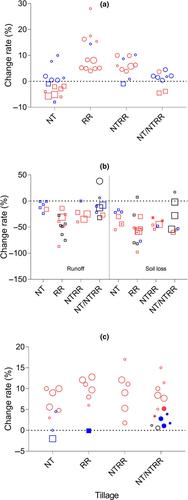当前位置:
X-MOL 学术
›
Glob. Change Biol.
›
论文详情
Our official English website, www.x-mol.net, welcomes your feedback! (Note: you will need to create a separate account there.)
Net effects of conservation agriculture principles on sustainable land use: A synthesis
Global Change Biology ( IF 11.6 ) Pub Date : 2021-09-28 , DOI: 10.1111/gcb.15906 Liangang Xiao 1 , Nikolaus J Kuhn 2 , Rongqin Zhao 1 , Lianhai Cao 1
Global Change Biology ( IF 11.6 ) Pub Date : 2021-09-28 , DOI: 10.1111/gcb.15906 Liangang Xiao 1 , Nikolaus J Kuhn 2 , Rongqin Zhao 1 , Lianhai Cao 1
Affiliation

|
Despite the strong recommendations from scientists, to till or not to till remains a confusing question for many farmers around the world due to the worries of crop yield decline and negative impacts on soils and environment. A confused understanding of the role of the individual principles of conservation agriculture significantly limits the effectiveness and applicability of soil conservation strategies and frameworks to achieve sustainable agriculture. By distinguishing clearly between the different principles of conservation agriculture, the net effects of no-tillage on improving and sustaining agro-ecosystems are analyzed based on 49 recent meta-analyses in this study. The review shows that no-tillage leads to a significant decline of crop yield (−8.0% to 10.0%, median: −1.9%), whereas residue retention represents the key driver for improving crop production (4.0%–28.0%, median: 8.2%). The efficacy of no-tillage for water erosion control, especially runoff (−24.0% to −0.7%, median: −10.0%), is often insignificant and otherwise lower compared to residue retention (−87.0% to −14.0%, median: −45.5%). Soil carbon sequestration potential under conservation tillage is quite limited or even close to zero, and if any, it can likely be attributed to the associated residue retention (−0.1% to 12.8%, median: 9.7%) rather than no-tillage (−2.0% to 10.0%, median: 4.8%). Our analysis illustrates that in conservation agriculture, no-tillage as the original and central principle of soil management is often less effective than associated supplementary measures, in particular residue retention. Residue retention may therefore play a key role for achieving sustainable land use. An additional benefit of residue retention is the less dramatic change of farming practices compared to no-tillage. The results of this review illustrate that a new framework for assessing the benefits of conservation practices has to be developed. To till, or not to till, is not the question: residue retention seems more critical.
中文翻译:

保护性农业原则对可持续土地利用的净影响:综合
尽管科学家提出了强烈建议,但由于担心作物产量下降以及对土壤和环境的负面影响,耕种或不耕种对世界各地的许多农民来说仍然是一个令人困惑的问题。对保护性农业个别原则的作用的混淆理解极大地限制了土壤保护策略和框架实现可持续农业的有效性和适用性。通过清楚地区分保护性农业的不同原则,根据本研究中最近的 49 项元分析,分析了免耕对改善和维持农业生态系统的净影响。审查表明免耕导致作物产量显着下降(-8.0% 至 10.0%,中位数:-1.9%),而残留物保留是提高作物产量的关键驱动因素(4.0%–28.0%,中位数:8.2%)。免耕对水侵蚀控制的功效,尤其是径流(-24.0% 至 -0.7%,中位数:-10.0%),与残留物保留(-87.0% 至 -14.0%,中位数: −45.5%)。保护性耕作下的土壤固碳潜力非常有限,甚至接近于零,如果有的话,这可能归因于相关的残留物保留(-0.1% 至 12.8%,中位数:9.7%)而不是免耕(- 2.0% 到 10.0%,中位数:4.8%)。我们的分析表明,在保护性农业中,免耕作为土壤管理的原始和中心原则通常不如相关的补充措施有效,特别是残留物保留。因此,残留物保留可能在实现可持续土地利用方面发挥关键作用。与免耕相比,残留物保留的另一个好处是耕作方式的变化较小。本次审查的结果表明,必须制定一个新的框架来评估保护措施的效益。耕还是不耕不是问题:残留物的保留似乎更为关键。
更新日期:2021-11-12
中文翻译:

保护性农业原则对可持续土地利用的净影响:综合
尽管科学家提出了强烈建议,但由于担心作物产量下降以及对土壤和环境的负面影响,耕种或不耕种对世界各地的许多农民来说仍然是一个令人困惑的问题。对保护性农业个别原则的作用的混淆理解极大地限制了土壤保护策略和框架实现可持续农业的有效性和适用性。通过清楚地区分保护性农业的不同原则,根据本研究中最近的 49 项元分析,分析了免耕对改善和维持农业生态系统的净影响。审查表明免耕导致作物产量显着下降(-8.0% 至 10.0%,中位数:-1.9%),而残留物保留是提高作物产量的关键驱动因素(4.0%–28.0%,中位数:8.2%)。免耕对水侵蚀控制的功效,尤其是径流(-24.0% 至 -0.7%,中位数:-10.0%),与残留物保留(-87.0% 至 -14.0%,中位数: −45.5%)。保护性耕作下的土壤固碳潜力非常有限,甚至接近于零,如果有的话,这可能归因于相关的残留物保留(-0.1% 至 12.8%,中位数:9.7%)而不是免耕(- 2.0% 到 10.0%,中位数:4.8%)。我们的分析表明,在保护性农业中,免耕作为土壤管理的原始和中心原则通常不如相关的补充措施有效,特别是残留物保留。因此,残留物保留可能在实现可持续土地利用方面发挥关键作用。与免耕相比,残留物保留的另一个好处是耕作方式的变化较小。本次审查的结果表明,必须制定一个新的框架来评估保护措施的效益。耕还是不耕不是问题:残留物的保留似乎更为关键。



























 京公网安备 11010802027423号
京公网安备 11010802027423号